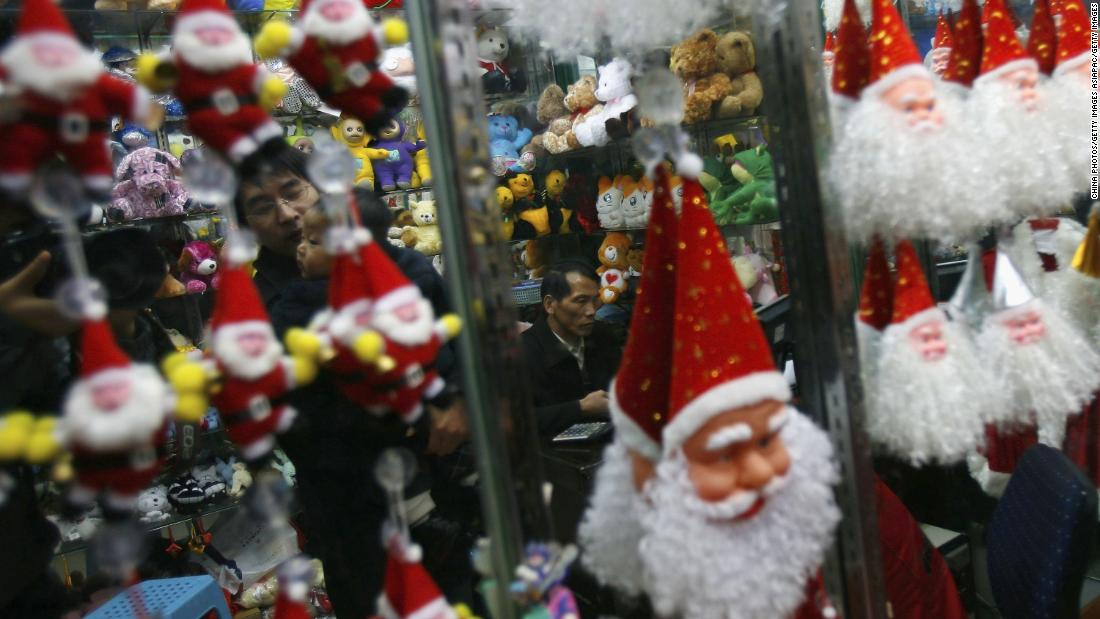
But production almost stopped in mid-December as local authorities turned off the lights.
Ma Hairu, who works for a manufacturer producing paper decorations for Christmas and New Year, said her factory is struggling to meet demand because they are only allowed to work half a day. “We have a lot of orders, but we don’t have enough time to do them,” he said.
Officials in China’s Zhejiang province are struggling to meet the five-year targets for energy consumption set by the central government, which is due to expire on December 31. Earlier this month, a local directive instructed businesses to stop lifts under the third floor and use heating only when outside temperatures dropped below 3 degrees Celsius (37 degrees Fahrenheit).
“There is no shortage of electricity [in Zhejiang]. Some places in the province have taken steps to restrict electricity consumption to save energy and reduce emissions, “Zhao Chenxin, secretary general of the National Development and Reform Commission (NDRC), said Monday.
The effort to reduce energy consumption has disrupted millions of lives. In Yiwu, a city of one million people, heating was turned off in offices, shopping malls, schools and hospitals, despite daytime temperatures of about 10 degrees Celsius (50 degrees Fahrenheit).
Zhejiang’s sharp reduction in electricity consumption highlights both the strength and pitfalls of China’s political system. While the Communist Party can make ambitious promises to reduce carbon emissions, the forced implementation of targets can have a cost to the people it ultimately needs to benefit from.
“A difficult year”
Some have accused the Yiwu government of sacrificing public safety to tick a box on a political bulletin.
Following the online reaction, officials turned on some lights again. “The lights have only been off for a few days. Most of them have been on now,” a government telephone line operator told CNN on Wednesday.
But other restrictions remain in place. Yin Mingfei, the manager of a cafe in a shopping center in the city’s central business district, said the heating had been turned off for almost two weeks and the electronic billboards and escalators were not working.
The city’s factories and workshops, whose businesses have already suffered from the coronavirus pandemic earlier this year, have been ordered to reduce or stop production at a time when orders are flooding.
December would have been the busiest time of the year for Liu Lei, who runs a small workshop with his wife in a Yiwu suburb, making red envelopes for the Lunar New Year. But he was ordered to work two days, two days off until the end of the year to save energy.
“It simply came to our notice then [on my business] is big. Orders are rushing for red envelopes, but there is no way we can get enough, “Liu said.” So I had to turn down a few. “
Target-oriented political culture
Similar struggles have taken place in the past – on a much larger scale and for months. In 2010, the last year of China’s 11th Five-Year Plan, Zhejiang and more than half a dozen other provinces launched measures to restrict electricity use.
“This is common in China. It’s a result of a target-oriented political culture,” said Trey McArver, a partner at Trivium Consulting in Beijing.
Without democratic elections, most Chinese officials climb the ladder of political careers in a performance-based evaluation system, where the goals of economic growth, social stability and, increasingly, environmental protection, play an important role in their chances of success. promotion.
Under Xi’s authoritarian rule, local officials are under more pressure – leaked from the central government – to meet Beijing’s political goals, such as those set out in the country’s five-year plans.
The five-year plans are a legacy of China’s command economy in the Mao era. These higher-level political plans set the country’s social and economic development goals for the next period. The 13th Five-Year Plan covers 2016-2020.
Competing targets
The province is allowed to consume only the equivalent of 23.8 million tons of coal above levels from 2015 to 2020, but there are indications that it would have been used too much.
The problem with goals is that there are often more to accomplish by officials and they are not always complementary, said McArver, the consultant. “The reason there is a struggle to achieve these goals here at the end is that local officials have focused primarily on other targets so far,” he said, such as GDP growth, employment and revenue. government.
The shutdowns caused by the coronavirus initially helped meet emissions targets, analysts said, but the rush to revive the economy has pushed it back. China’s rapid economic recovery from the pandemic has been largely based on energy-intensive heavy industries, said Li Shuo, senior climate policy adviser for Greenpeace East Asia.
For Yiwu producers, there was also a return to production after an increase in orders after the summer. But that turned out to be short-lived.
Ma, who makes and sells festive decorations, said it has been a particularly tough year for business, first due to the pandemic and now electricity restrictions.
“We used to make revenue of over one million yuan ($ 150,000), but with all the interruptions this year, we don’t really know how much we can do,” he said.